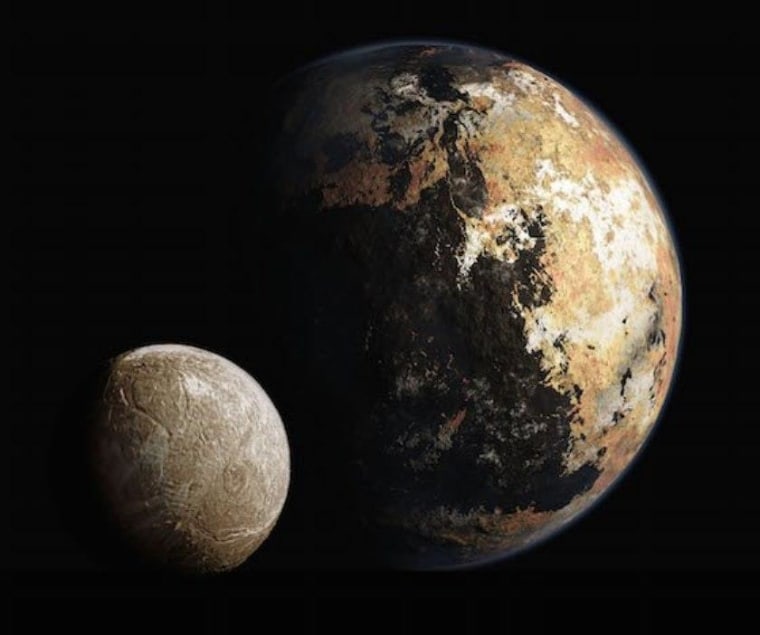Want to see Spock Crater on Pluto, or the Nimoy Mountains on its biggest moon, Charon? Here's your chance: The scientists involved in NASA's New Horizons mission to the dwarf planet and its satellites want you to help them come up with a long list of names that can be used for all the geological features they're sure to discover during July's unprecedented flyby.
"The Pluto flyby this summer will be a major milestone in planetary exploration," Alan Stern, a planetary scientist at Southwest Research Institute who is the principal investigator for New Horizons, said in Friday's announcement kicking off the naming project. "We are really looking forward to hearing the public’s ideas for feature naming on Pluto and Charon."
Traditionally, solar system bodies and their features are named by their discoverers and the International Astronomical Union's task groups. For New Horizons, the discovery team wants to streamline the process for the IAU by having a hefty catalog of potential names ready to go. The "Our Pluto" website provides a list of potential names, organized into several themes:
- History of exploration— including explorers, scientists and engineers as well as spacecraft and space missions.
- Literature of exploration — including fictional explorers (such as Star Trek's Mr. Spock and Star Wars' Luke Skywalker), origins and destinations (Vulcan and Tatooine), fictional vessels (Battlestar Galactica and Millennium Falcon) and authors and artists (Leonard Nimoy and Isaac Asimov).
- Mythology of the underworld — the places and people mentioned in sagas about the underworld or death (like Pluto and Charon), travelers to the underworld (Orpheus and Eurydice), and the denizens of the underworld.
You can vote for your favorites on the project's long lists, or use the nomination form to suggest your own names. Mark Showalter, a planetary scientist at the SETI Institute who organized a similar project to name two of Pluto's moons, said the best suggestions would be added to the ballot.
For what it's worth, Star Trek-themed names are among the early leaders in the voting, but Showalter emphasized that the voting procedure would be fluid. "The ballot will change," he told NBC News, "and we will take into consideration that one name was there on Day 1 and another was added on Day 10."

He also emphasized that the top vote-getters won't necessarily be selected in the end. The chosen names have to be appropriate for the context and pass muster with the IAU. That's why Vulcan, the winner of the moon-naming vote in 2013, was passed over: It didn't seem right to name an icy moon after the Roman god of fire.
Also, the geographical names can't all be Star Trek characters. "We want to honor the vote, but we also want to honor diversity," Showalter said. The discovery team wants to make sure a wide variety of cultures from around the world are recognized.
The "Our Pluto" naming campaign runs through April 24, and Showalter said he's looking forward to learning about names he never would have dreamed of. He's also looking forward to seeing all the craters, mountains, channels and other undreamt-of features that will be crying out for those names.
"There's nothing wrong with a cratered ball," Showalter said, "but this is not going to be just a cratered ball."
#DearPluto: In addition to the "Our Pluto" naming project, the New Horizons mission has inspired a letter-writing campaign for kids. An educational program known as Janet's Planet is soliciting handwritten, hand-illustrated #DearPluto letters as well as video dispatches in which kids can pass along their thoughts about the flyby and the dwarf planet (including whether it's a "real" planet).
Dwarf Planet Pride Day: Pluto and its fellow dwarf planets will have their day in Seattle on March 28, when New Horizons principal investigator Stern, planetary scientist Sarah Ballard, astronomer Oliver Fraser and NBC News' Alan Boyle (author of "The Case for Pluto") converge on Greenwood Space Travel Supply Co. for Dwarf Planet Pride Day. There'll be a sign-making session for kids, a Dwarf Planet Pride Parade down the sidewalks of Greenwood Avenue, and a student-led debate of planetary proportions. Get there by 2 p.m. PT for the parade!
Update for 7:55 p.m. ET April 6: The deadline for getting in your vote or suggestion has been extended from April 7 to April 24. NASA has more details about the extension of the "Our Pluto" campaign. Showalter says more than 40,000 submissions have been received so far.
